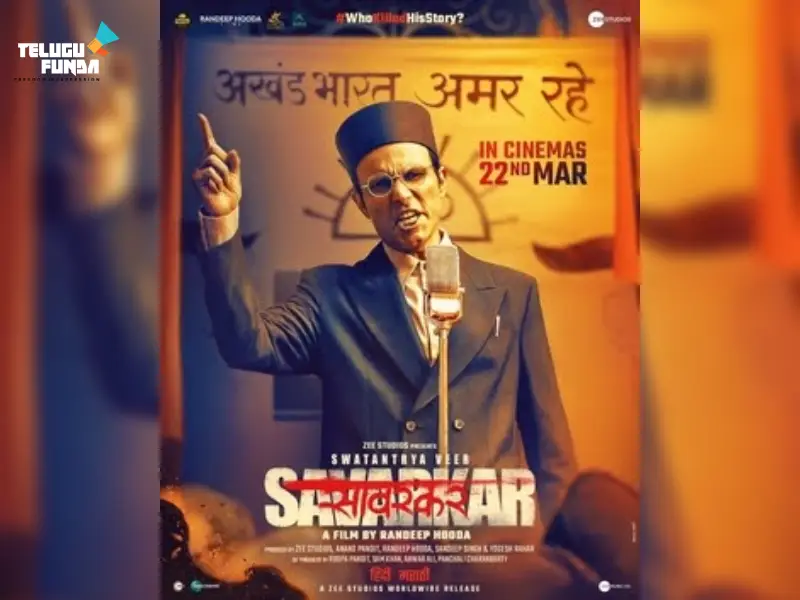Randeep Hooda’s ambitious project as a debut writer and director succumbs to mere villainizing and valorising: The best tool for a propaganda film.
Right from the announcement of the Swatantrya Veer Savarkar, the politics of it were understood. Randeep Hooda, the protagonist and director of the movie, didn’t shy away from stating, albeit stoutly, what he believed to be ‘the truth’ questioning popular understanding of Indian history.
Swatantrya Veer Savarkar begins with of Britishers murdering, raping and brutally mass-buring Indians. The imagery is quite evocative, and effective too– following the stereotypical portrayal of Britishers in Indian cinema along the lines of Ashutosh Gowariker’s Lagaan (2001) and the latest global blockbuster S S Rajamouli’s RRR (2022). This portrayal continues, just layering the brutality on Muslims too, throughout the film If the Brutality of Brits is shown through the dismissal and demeaning behavior, the brutality of Muslims is emphasized through the violent beatings of ‘Hindus’ in prisons upon the orders of Britishers
Engrossment with Ideologies
Randeep Hooda, along with the co-writer Utkarsh Naithani, tried to make a holistic biopic. Hence, the lengthy three-hour runtime. The length is justifiable considering the encompassment of a historical man’s journey from adolescence to his death, parallelly narrating India’s struggle for Independence spanning across six decades.
The two things that can engage you through the three-hour saga of Savarkar and India’s struggle for Independence are the actor Randeep Hooda and the director Randeep Hooda. He has dedicated himself wholeheartedly for the film. The performance is incredibly powered with the several fierce ideological conflicts throughout the film.
Apart from the obvious extreme political nature of the film, the cinematography of Arvind Krishna is to be appreciated for dramatizing the scenes with staging of lights. The most intense scenes in the movie are shot in pitch-dark with soft light focusing on Savarkar. I think the whole intellectual energy went into the politicalness of the movie. You barely hear any thematic music in the background. The music composed by Hitesh Modak and Shreyas Puranik simply remains as a peripheral supplement to the scenes. The advantage of this is that it doesn’t distract you from the politics of the movie. Filmmakers took a good move in this aspect.
Anti-Gandhianism
“I don’t hate Gandhi, I hate non-violence”, says Savarkar to Nathuram Godse- the convicted murderer of M K Gandhi- when Godse blames Gandhi for “everything” that went wrong with the nation. He even goes to the extent of saying, “Pen is no longer mightier than the sword” in a public meeting addressing college students urging them to take up arms given by Britishers for World War 2 to turn the arms against them. Randeeo Hooda cries on the shoulder of his brother saying, “The nation is left as an orphan now” after the death of Balagangadhar Tilak. This happens in the movie right at the moment when Gandhi is gaining momentum in india.
Undoubtedly, Savarkar was a pure Anti-Gandhian, at least the version of Randeep Hooda’s. Gandhi was belittled at every frame. Randeep Hooda’s Savarkar never took Gandhi seriously. Gandhi is minimised to the Varna-system (caste-system) loving appeaser of Muslims. Of course, the politics of Gandhi might not be as Mahaan as we dearly call him Mahatma, nor of Savarkar’s. However, that is what makes a good propaganda film, i.e., making the audience skeptical of their own understanding of history.
Defenseless Characterisation
A good movie that intends to distinguish the good from the evil gives you scope to understand the why of the evils too. It means, it makes you understand why the character is so evil as perceived by the protagonist, thereby the audience too. In this aspect, Swatantrya Veer Savarkar failed miserably.
The ideological opponents of Savarkar in the movie are made defenseless in the movie. Be it Britishers, or Muslims, or Gandhi. When Savarkar questions the Britishers, “I am doing exactly What would you do if Germans were to attack and occupy British”, the Britishers sulk down in guilt with zero defense. The worst is yet to come. Ofcourse, it is with Gandhi.
Gandhi visits Savarkar to seek the wisdom from Savarkar, as told in the film, on his understanding of Caste. Savarkar says, “Arrange mass inter-caste marriages, the next fourth generation will forget the caste and finally everyone will become Hindus.” At this point, Gandhi defends the Varna System and suggests not to “fiddle” with it. As the conversation comes to an end, Gandhi praises Savarkar to his wife for not being able to ’discuss for an hour’ and how she was living with him.
Isn’t naivety of the director to believe that both Gandhi and Britishers didn’t have an explanation? If not, is it done purposefully, to fuel the propaganda? Britishers were the ones who violently believed in the so-called ‘virtuous’ “white-man’s-burden”. It is propagatory to showcase them as characters without content. That is what this film ends up being eventually.
Historical Inaccuracy or An Exaggerated reality?
Ofcourse, this question had to arise for all the right reasons. Because, the main idea of this movie is to question the popular understanding of Indian history. Therefore, the ‘claims’ presented in the movie will be scrutinized at a microscopic level because of the soundness of its propaganda. Especially, when Randeep Hooda breaks the fourth-wall directly speaking to the camera, in the middle of the movie, to talk about the ideology of ‘Hindutva’- the most contemporary and controversial mainstream political ideology, whose debate is still unsettled over its definition. Who is he really talking to?
There is a ample of evidence that tells us how Bhagat Singh and Netaji Subhash Chandra Bose were inspired by Veer Savarkar’s writings, as proudly proclaimed not only in the movie but also in the promotional teasers. However, the argument over the extent of Savarkar’s influence on them still persists.
I believe films like Swatantrya Veer Savarkar are much needed to keep the sluggish academic debate alive and keep the established ideologies questioned. The recent right-wing movies are doing this avowedly, like The Kashmir Files and The Kerala Story and many more. Nonetheless, Randeep Hooda’s lifetime project succumbs as nothing more than villainizing Musilims, Gandhi & Bristishers and Valorising none other than Vinayak Damodar Savarkar.
Swatantra Veer Savarkar is now streaming on Zee5.
Follow Telugu Funda on trending Social Media Platforms for more Cinema, OTT, Political, And Sports updates

![1727184735162_logo new 01[1]](https://telugufunda.com/wp-content/uploads/2025/04/cropped-1727184735162_logo-new-011-1.png)



